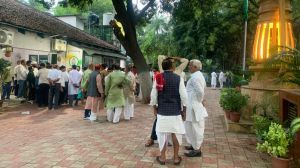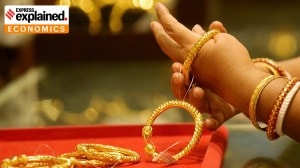Not a very great Alexander
Dr P C Alexander has held more high offices, and been more closely involved in policy formation than any of his IAS peers. He was no doubt ...

Dr P C Alexander has held more high offices, and been more closely involved in policy formation than any of his IAS peers. He was no doubt an outstanding officer and, as he concedes in a rare lapse into modesty in his autobiography, ‘‘I do admit that luck plays its role in everyone’s life and I had perhaps a larger share of it than many others’’.
But this larger share of luck, instead of inducing an attitude of modesty, has whetted his appetite for a still larger helping of it. In his recently released autobiography, Through the Corridors of Power—An Insider Story, he begins his journey through life with a 40-page chapter on how the exalted office of President of India came well within his grasp, and how the opposition of the Congress and the machinations of the Natwar Singh-Brajesh Mishra duo robbed him of this well-deserved finale to his glorious career. He fails to comprehend as to why, despite his close association with Indira Gandhi and Rajiv Gandhi, the Congress refused to join hands with the BJP to support his candidature as the President!
No doubt an upsetting moment for Mr Alexander. Yet to fill 40 pages moaning and groaning over it, and continuously blowing his own trumpet about his own ‘integrity’ smacks of excessive self-importance.
For a person whose career zoomed entirely owing to the patronage of the two Congress prime ministers to suddenly become such a darling of the BJP and Shiv Sena as to not only be given a second term as governor of Maharashtra but also to be sponsored as their candidate for the President’s office does sound a little intriguing.
Whereas the reasons for the Congress not supporting Alexander are more than obvious, was it really necessarily to conjure the Natwar Singh-Brajesh Mishra conspiracy theory for throwing a spanner in the works? The former was in the Opposition and the latter was there to further Vajpayee’s objectives, and not to sabotage them. This fanciful search for a scapegoat only detracts from the writer’s credibility.
Alexander was a witness to the later phase of India’s freedom struggle. He belonged to the first batch of the IAS. But so intense is his self-absorption that these events are hardly noticed and he focuses entirely on the limited field of his own personal activities!
The one issue where Alexander was given a lot of space to sort out matters was the Punjab problem, which culminated in Operation Blue Star and Indira Gandhi’s assassination. He describes in detail the numerous meetings he held with the Akali leaders. But who represented the government side? Except for two meetings taken by Indira Gandhi, it was mostly the team of Alexander, cabinet secretary Krishnaswamy Rao Sahib, and home secretary
T N Chaturvedi. Despite his keen political perception, it never struck him that none of them was a Punjabi with any insight into the Sikh psyche or knowledge of Akali politics. No wonder, things got badly out of hand and the country paid a horrendous price.
Why were the IB and RAW not instructed to supply the necessary information to the Army? The Army operation in Punjab was the end product of a failed political process that was handled by none other than Alexander.
Another grave failure of intelligence was to tighten Indira Gandhi’s security. Whereas he was personally involved and maintained a detailed log book of events, he shows convenient lapses of memory on certain important points. For instance, he states that the Army was promptly summoned on November 1—a day after Indira Gandhi’s assassination—to control the situation. The fact is that the Army was put on the alert that day, but the rioters had a free run of the city and the Army swung into operation only on the night of November 3. Then he writes that the government completed the restoration of Akal Takht with the help of Santa Singh. This is totally wrong. At that time I was information and broadcasting secretary and attended a meeting convened by Alexander, where the proposal to undertake restoration work of Akal Takht by the government was also discussed. I opposed the proposal and argued that the Sikhs would treat it as an insult, as according to their tradition such tasks must be performed as kar sewa by the community. When I stuck to my point, Alexander said: ‘‘Gill, this is a political issue and let us leave it to politicians.’’ The government did undertake the restoration but the Akalis demolished the structure and rebuilt it by kar seva.
Alexander claims his book to be ‘An Insider’s Story’. He writes in detail about the work he did as principal secretary to Mrs Gandhi. Though here the narrative becomes racy, there are hardly any revelations. Instead, there is self-glorification. No doubt Mrs Gandhi trusted him, but he gives the impression he was the only one on whom she relied. In fact G Parthasarathy, whom she fondly addressed as ‘GP’, enjoyed as much of her trust. R Venkataraman, P V Narasimha Rao and Pranab Mukherjee were consulted on most vital issues. There were many others. She was very particular not to rely on the advice of one person only, and cross-checked facts from various sources. But Alexander nowhere indicates how complex the decision-making process of his boss was. Mine is admittedly a one-sided account and I carry no chip on my shoulders as he was always very kind to me. But a word to my dear friend. Having received such helpings of good fortune during his career, was it not incumbent upon him to rein in his ambitions in his octogenarian years, and show greater modesty and restraint in presenting his case for posterity?
The writer is ex-Information and Broadcasting secretary






- 01
- 02
- 03
- 04
- 05

























